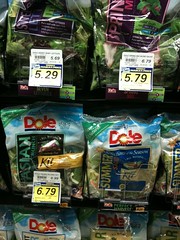My focus for the last several years has been food preparation, and as a result I have becoming increasingly aware of where food comes from and how it was treated from harvest until it ends up in my home. My values about food have developed and I came to understand that for any individual, what they choose to buy, eat and drink is a very complex and therefore I only offer you my perspective and nothing more.
I prepare a variety of different foods and I strive that the food on my table are:
- Health promoting (to the best of my knowledge and experience)
- Non-polluting (how and where they are grown) / pollution free (no chemical residue)
- Satisfy me and/or family at the present moment ( taste,smell, desires, etc)
- Do not cause any undesired side affects (altered moods, after-taste, intoxication, health issues)
Eating outside of the home is a little different, but generally these values hold true with some exceptions which I will save for another post.
So what's wrong with buying bagged lettuce?
Keeping in mind that this question can be argued both ways. Bagged lettuce does offer convenience in prep time and seems to last longer in the fridge.
Let's try to list out some facts about it and you decide if there is anything wrong with it.
- Do you know the variety, where it was grown, and who grew it?
- It's important if you want to minimize the distance your food travels, reducing pollution.
- Also the less it travels, the less likely it was treated after harvest, and contains less chemical residue. Its packaging is possibly less polluting as well.
- Is it in season? Seasonal produce is generally better
- Is it a heirloom lettuce, local to it's surroundings, or a hybrid variety? Local heirloom variety is best.
- Is it GM food? They haven't developed any GM (genetic modifications) for lettuce as of this post, but other produce are GM such as corn and soybeans.
- Do you know how it was grown?
- Specifically if the soil was organic, or if it even needed soil. What was used, if anything to fertilize it, keep little critters or bigger animals off.
- Also who planted it, maintained the fields and who harvested it? It may be important if fair labor is important to you, or if the farm or processor has a history of poor practices.
- How and when was it harvested and processed?
- What was used to harvest, process it, wash it?
- Was liquid solutions of bleach(sodium hypochlorite) or chlorine(hypochlorous acid) or gas used to sanitize it?
- Was there any other treatment or processing after harvest? Radiation, x-rays?
- What else is in the bag? Plastic bags are filled with lettuce in factories and sealed with what inside?
- If it's local, it's more likely to be fresher (0 - few days old) and contains more benefits when you eat it. It's also likely to be less processed
- How much does it cost per pound or per ounce?
- Lettuce comes in 6oz, 8oz, 10oz, 12oz bags but knowing what you pay for it is valuable. Generally the higher price equals organic but not all the time.
- Grow your own food and teach your family to grow some too
- Join a local CSA or buying club
- Go to local farmers markets
- Eat more local and seasonally
- Demand better produce
- Buy more fresh, raw, unadulterated food including loose lettuce. Wash it and chop it yourself! Learn how to store it.
- Read product labels and research the company so you know more.


No comments:
Post a Comment